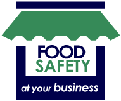
Food Safety At Your Food Business
The recent Listeria outbreak at a Melbourne catering company that provided meals to other businesses, highlights the need for food businesses to ensure they do all they can to make sure the food they provide (sell), for their customers/residents/patients is safe.
Listeria is not the most common cause of food poisoning, but it does have a high rate of mortality among the people that contact it – this is about 20%, (as a comparison, Salmonella has about a 1% mortality rate), with high risk foods being things like soft cheeses and deli meats. Listeria is bacteria that is present in the environment, so can get on to most foods, last year there was an outbreak concerning rockmelons.
Businesses that sell food must ensure they do all the can to reduce the risk of contamination to food and to reduce to a safe level, the presence of any bacteria that may cause food poisoning. Here are a few things that may help to identify any gaps in the food safety at your business: -
- Approved Suppliers: Make sure that the companies supplying food to your business are up to standard, this may include asking them for a HACCP certificate, food licence from the state-based authority, or even a copy of the last local council inspection at their business. You can even arrange a visit to the business for yourself or a food safety consultant, to put your mind at rest;
- Receival: Inspect the food when it arrives at your business, take temperatures of potentially hazardous food such as dairy, cooked and raw meat and check that frozen food is really frozen solid. If the temperature is not good (5 C or under for potentially hazardous food, frozen solid for frozen food), do not accept the food, remember that once you accept the food, by your actions you have agreed that the food is good and are now responsible for it. Record the temperature of cold deliveries, this can be done using pen and paper, or with the FRANK food safety system.
- Storage: Place food deliveries in the appropriate storage as soon as possible, (fridge/coolroom or freezer). Check the temperature of the cold storage units at least once a day – twice is better, record the temperature of the cold storage units in your business, either on a paper form or with the FRANK app.
- Preparation: Ensure chopping boards used for food preparation are clean and sanitised, some places will use different colour chopping boards for different jobs, but as long as they are clean and sanitised – this will go a long way to reduce the risk of cross contamination:
- Cooking: Food must be cooked to a safe temperature to ensure that any harmful bacteria within the food are reduced in number to a level that is unlikely to cause food poisoning. Some food cooking temperatures should be taken, again the FRANK app is an easy way to achieve this:
- Serving: One of the best ways to keep food safe during serving is to serve the food directly after cooking so that there is very little time for bacteria to grow.
- Wash up: The washing of food contact equipment, such as plates, cutlery etc. is extremely important to reduce the risk of food poisoning. If you are using a dishwasher, the rinse cycle must be at a high enough temperature to kill the bacteria, (this is usually 82 C), if you don’t have a dishwasher in the kitchen then a double sink can also work well – the first sink has warm soapy water to remove visible dirt, the second sink has a food grade sanitiser in it to kill any bacteria still left on the crockery and cutlery after washing.
- Staff Skills and Knowledge: One other very important point to mention is that the staff in your food business must have the skills and knowledge for the role that they are doing – it is up to the food business to ensure that staff are properly trained for the job they are doing. This includes if somebody is just “helping out” in the kitchen because they were short staffed, or if you had agency staff for a couple of days – it is still up to the business to make sure staff know what they are doing. If you would like to know more about what kind of training staff need, contact us at Food Safety Systems.


